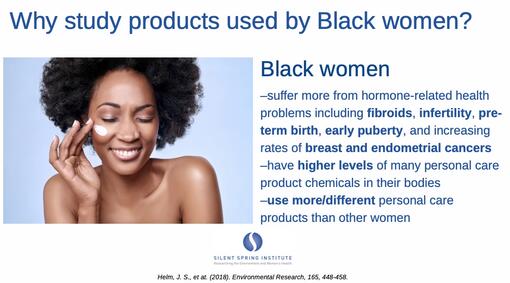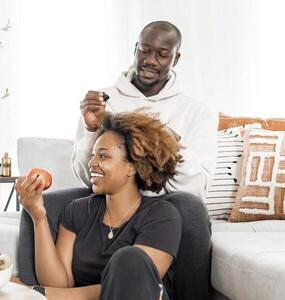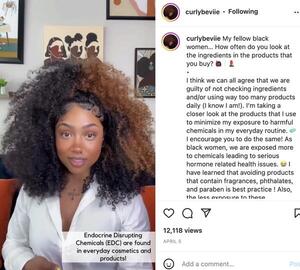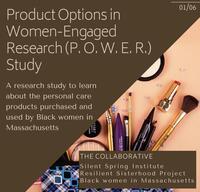Using Social Media to Reduce Black Women's Exposures to Toxic Chemicals in Consumer Products
Project Details
Year: 2020-2022
Location: Statewide
Project Manager: Elissia Franklin and Robin Dodson, Silent Spring Institute
Partners: Lilly Marcelin and Aleyana Momplaisir, Resilient Sisterhood Project
Black women are disproportionately exposed to many hormone-active consumer product chemicals, including phthalates and parabens. They often suffer more from hormone-mediated health issues such as uterine fibroids, preterm birth, and more aggressive forms of breast and endometrial cancers.
This project worked to educate women about chemical exposures that can contribute to hormone disruption, asthma, diabetes, and cancer risk among Black women, and to share information about safer alternatives. The first year of the project focused on learning more about how women make choices about the products they purchase and use. The second year focused on sharing information widely by training and supporting social media influencers.
Results
This project was a collaboration between Silent Spring Institute and Resilient Sisterhood Project. To learn more about consumer product use patterns among Black women living in Massachusetts, the project team held five small, discussion-based virtual workshops with 25 women focused on why and where women purchase certain beauty products. Women were asked to use a smartphone app to log their personal care product use over several days. The app data includes information about which products women are using, listed ingredients, and where products were purchased. The project team held follow-up workshops to share summaries of the discussions and app use, and to discuss feasibility of recommendations to reduce exposure to hormone-disrupting chemicals in products.
This community-engaged project was designed to support additional exposure studies, intervention studies, educational outreach and consumer campaigns. A key finding from the project was that women emphasized the role of social media and social media influencers in learning about personal care products, suggesting avenues for sharing educational outreach. Women wanted to know more about the ingredients in their products and about the importance of representation in the brands marketed to Black women. They learned about commonly used products and the ingredients of health concern associated with those products.
Meeting Women Where They Are
In the second year, the project team recruited ten social media influencers with a combined following of over 780,000 people. They held training workshops to present environmental health information to the influencers, and worked iteratively with the influencers to develop social media content. Developed content was viewed by more than 100,000 followers, liked by nearly 10,000 followers, and shared by more than 1,700 followers. Followers reported that the content increased their concern about chemicals in products may affect their health. Using a novel dissemination approach, this project reached thousands of Black women to share information about consumer product chemical exposures, potential impacts on health, and simple, effective steps for shifting to safer alternatives.
This page updated Thursday September 22 2022




